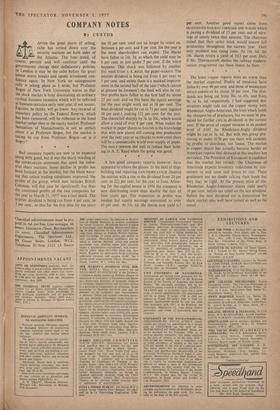COMPANY NOTES
By CUSTOS
AFTER the great storm of selling, calm has settled down over the security markets on both sides of the Atlantic. The bear trend, of course, persists and will continue until the governments change their deflationary policies. In London it may be the calm before the great labour storm breaks and upsets investment con- fidence again, In New York an unimpressive rally is taking place as I write, but Professor Bogen of New York University warns us that the stock market is busy discounting an ordinary cyclical business recession which will be reflected in business statistics early next year, if not sooner. Equities, he thinks, will go lower. Any reversal of monetary policy by the Federal Reserve, which has been rumoured, will be reflected in the bond market rather than in the equity market. Professor Samuelson of Massachusetts is not so certain about it as Professor Bogen, but the market is taking its cue from Professor Bogen-or is it Bogey?
Bad company reports are now to be expected along with good, but it was the sharp wording of the COURTAULDS statement that upset the indus- trial share markets. Some decline in profits has been forecast in the market, but the blunt warn- ing that unless trading conditions improved 'the profits of the group, which now includes British Celanese, will this year be significantly less than the combined profits of the two companies for the year to March 31, 1957' was a real shock. The interim dividend is being cut from 4 per cent, to 3 per cent., so that for the first time for ten years the 10 per cent. total can no longer be relied on. Between 6 per cent. and 8 per cent, for the year is the most shareholders can expect. The shares have fallen to 24s. 3d. at which the yield may be 6 per cent, or just under 5 per cent. if the worst happens. This shock was followed by another this week from A. E. REED, the paper-makers. The interim dividend is being cut from 6 per cent, to 5 per cent, and unless there is a marked improve- ment in the second half of the year ('which cannot at present be foreseen') the final will also be cut. Net profits have fallen in the first half by about 25 per cent, and on this basis the equity earnings for the year might work out at 18 per cent. The final dividend might be cut to 74 per cent. (against 10 per cent.), making 12+ per cent. for the year. The shares fell sharply by 5s. to 30s., which would allow a yield of over 8 per cent. What makes the market in paper shares so bearish is the knowledge that with new plants still coming into production over the next year or so (thanks to BOWATER) there will be a considerable world over-supply of paper. The DAILY MIRROR did well to reduce their hold- ing in A. E. Reed when the going was good.
•• • A few good company reports, however, have appeared to relieve the gloom. In the field of ship- building and repairing HAWTHORN LESLIE cheered the market with a rise in the dividend from 20 .per cent, to 224 per cent. for the year to June. Allow- ing for the capital bonus in 1954 the company is now distributing more than double the rate of four years ago. The expansion in profits was modest but equity earnings amounted to over 65 per cent. At 33s. 6d. the shares now yield 6.7
per cent. Another good report came from
GLOUCESTER RAILWAY CARRIAGE AND WAGON Which
is paying a dividend of 15 per cent, out of earn- ings of nearly twice that amount. The chairman stated that their order book would ensure full production throughout the current year. Their only problem was rising costs. At 14s. 6d. the 10s. shares return a yield of 10.3 per cent. Only if Mr. Thorneycroft slashes the railway modern- isation programme can these shares be hurt.
The latest copper reports were no worse than the market expected. Profits of RHOKANA have fallen by over 40 per cent. and those of RHODESIAN ANGLO-AMERICAN by about 30 per cent. The divi- dends are being cut from 70s, to 45s. and from 9s. to 6s. 6d. respectively. I had suggested that investors might ride out the copper slump with Rhodesian Anglo-American, the trust which holds the cheapest lot of producers. but we must be pre- pared for further cuts in dividends in the current year. If the price of copper remains at its present level of £185 the Rhodesian-Anglo dividend might be cut to 3s. 6d. But with this group pro- ducing at under £150 per ton there will certainly be profits to distribute, not losses. The market in copper shares has actually become harder on American reports that demand at the smelters has increased, The President of Kennecott is confident that the market has turned : the Chairman of Anaconda expects inventory reductions by con- sumers to end soon and prices to rise. These gentlemen are no doubt talking their book but they may be right. At the present price of 66s. Rhodesian Anglo-American shares yield nearly 10 per cent. before tax relief on the last dividend. Before the next dividend cut is announced the share market may well have turned as well as the metal.
































 Previous page
Previous page